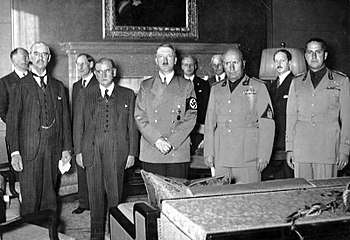Italy–United Kingdom relations
Italy–United Kingdom relations, also known as Anglo–Italian relations or Italo–British relations, are the international relations between the Italian Republic and the United Kingdom of Great Britain and Northern Ireland.
 | |
United Kingdom |
Italy |
|---|---|
| Diplomatic mission | |
| Embassy of the United Kingdom, Rome | Embassy of Italy, London |
| Envoy | |
| Ambassador Jill Morris | Ambassador Raffaele Trombetta |
The Italian ambassador to the United Kingdom is Raffaele Trombetta since January 2018;[1] the British ambassador to Italy is Jill Morris since July 2016.
Country comparison
| Coat of arms |  |
 |
| Population | 60,317,116 (2020 estimate) | 67,886,004 (2020 estimate) |
| Area | 301,340 km² (116,350 sq mi) | 243,610 km² (94,060 sq mi) |
| Population density | 201.3/km² (521.4/sq mi) | 255.6/km² (661.9/sq mi) |
| Capital | Rome | London |
| Largest city | Rome – 2,860,009 (4,342,212 Metro) | London – 8,600,000 (13,709,000 Metro) |
| Government | Unitary parliamentary constitutional republic | Unitary parliamentary constitutional monarchy |
| Current Leader | President Sergio Mattarella
Prime Minister Giuseppe Conte |
Queen Elizabeth II
Prime Minister Boris Johnson |
| Official languages | Italian | English |
| Main religions | 83.3% Christianity, 12.4% No religion, 3.7% Islam, 0.2% Buddhism, 0.1% Hinduism, 0.3% others | 59.4% Christianity, 25.7% No religion, 7.8% Unstated, 4.4% Islam, 1.3% Hinduism, 0.7% Sikhism, 0.4% Judaism, 0.4% Buddhism (2011 Census) |
| Ethnic groups | 91.5% Italians, 8.5% others | 87% White (81.9% White British), 7% Asian British (2.3% Indian, 1.9% Pakistani, 0.7% Bangladeshi, 0.7% Chinese, 1.4% Asian Other), 3% Black, 2% Mixed Race (2011 Census) |
| GDP (nominal) | US$1.989 trillion ($32,947 per capita) | US$2.744 trillion ($41,030 per capita) |
History

Diplomatic relations between Britain and Italy predate both Britain and Italy's unification, with diplomatic exchanges between the Papal States and England growing particularly heated during the investiture disputes between kings William and John and their respective archbishops of Canterbury Anselm and Langton. The latter feud ended with John's excommunication being lifted in exchange for swearing his fealty to the papacy.
Later, the Court of St. James hosted ambassadors from various states of the Italian peninsula, including those of the Kingdom of Naples and Sardinia's Count Perron. The British government gave moral and diplomatic support to the "Risorgimento" (Unification of Italy) and the creation of the modern Italian state against considerable international opposition.[2] The famed hero of unification, Giuseppe Garibaldi was widely celebrated in Britain, with a peak in 1861.[3]
Twentieth century
Italy and Great Britain concluded the London Pact and entered a formal alliance on 26 April 1915. Following this, Britain, Italy, and the rest of the Allied Nations won the First World War. During that war, British intelligence subsidized Benito Mussolini's activism.[4] After he rose to power on a fascist agenda, Mussolini was initially accommodated by Britain, with the Hoare-Laval Pact accepting the expansion of Italian Eritrea's sphere of influence over all of Abyssinia (modern Ethiopia). However, the treaty's unpopularity forced Hoare's resignation,[4] and future British governments showed more opposition.[5]
Owing to Mussolini's Axis Pact between his Italy and Hitler's Germany, in 1940 Italy joined the Second World War on the side of Germany. Britain and Italy were thus at war through the early 1940s, until the Allied invasion of Sicily ended with Italy's defeat in 1943. The Italian government overthrew Mussolini in 1943 and signed an armistice with the Allies. Germany meanwhile invaded the northern half of Italy, released Mussolini, and set up the Italian Social Republic, a puppet regime that helped Germany fight against the Allies until it collapsed in spring 1945.[6]
The United Kingdom and Italy now enjoy a warm and friendly relationship. Queen Elizabeth II has made four state visits to the Italian Republic during her reign, in 1961, 1980, 2000, and April 2014, when she was received by President Giorgio Napolitano.
Cultural relations
Between 4 and 5 million British tourists visit Italy every year, while 1 million Italian tourists visit the UK.[7] There are about 30,000 British nationals living in Italy, and 200,000 Italians living in the UK.[8]
In 2011, 7,100 Italian students were studying in UK universities, this is the seventh-highest figure amongst EU countries and fifteenth globally.[9]
Association football, in its modern form, was said to have been introduced to Italy by British expatriates during the 1880s. Genoa Cricket and Football Club, founded by Englishmen in 1893, was allegedly formed as a cricket club to represent England abroad. Three years later in 1896 a man named James Richardson Spensley arrived in Genoa introducing the football section of the club and becoming its first manager.[10] Other evidence suggests that Edoardo Bosio, a merchant worker in the British textile industry had visited the United Kingdom and decided to introduce the sport in his homeland. He returned to Turin in 1887 and founded Torino Football and Cricket Club.[11]
Politics
Both states are members of the NATO, Council of Europe, Organization for Security and Co-operation in Europe and the G7.[12]
See also
- List of Ambassadors from the United Kingdom to Italy
- Foreign relations of the United Kingdom
- Foreign relations of Italy
- Italians in the United Kingdom
- Holy See–United Kingdom Relations (including its history as the Papal States)
- European Union–United Kingdom relations
References
- "AMBASSADOR Pasquale Terracciano". Italian Embassy, London (in Italian). Retrieved 21 November 2014.
- D.E.D. Beales, England and Italy, 1859-60 (1961).
- Marcella Pellegrino Sutcliffe, "Marketing ‘Garibaldi panoramas’ in Britain (1860–1864)." Journal of Modern Italian Studies 18.2 (2013): 232-243.
- Kington, Tom (2009-10-13). "Recruited by MI5: the name's Mussolini. Benito MussoliniDocuments reveal Italian dictator got start in politics in 1917 with help of £100 weekly wage from MI5". London: Guardian. Retrieved 2009-10-19.
- James C. Robertson, “The Origins of British Opposition to Mussolini over Ethiopia.” Journal of British Studies' , vol. 9, no. 1, 1969, pp. 122–142. JSTOR, www.jstor.org/stable/175172
- R.J.B. Bosworth, Mussolini's Italy: Life Under the Fascist Dictatorship, 1915–1945 (2007)
- Italy Country Profile, Foreign and Commonwealth Office
- Bilateral Relations British Embassy, Italy Archived 2007-06-08 at the Wayback Machine
- "International students in UK higher education: key statistics". UK Council for International Student Affairs. Retrieved 2012-07-24.
- "English Players in Italy". RSSSF.com. Archived from the original on 21 September 2007. Retrieved 1 August 2007.
- "Edoardo Bosio and Football in Turin". Life in Italy. Retrieved 1 August 2007.
- Embassy of Italy in London: Political Cooperation
Further reading
- Baldoli, Claudia. Exporting fascism: Italian fascists and Britain's Italians in the 1930s (Oxford: Berg, 2003).
- Edwards, Peter G. "Britain, Mussolini and the 'Locarno-Geneva System'." European History Quarterly 10.1 (1980): 1-16.
- Hayes, Paul. Modern British Foreign Policy: The Nineteenth Century 1814-80 (1975) pp. 194-212.
- Horn, David Bayne. Great Britain and Europe in the eighteenth century (1967), covers 1603 to 1702; pp 327-51.
- Morewood, Steven, "Anglo-Italian Rivalry in the Mediterranean and Middle East, 1935–1940." in Robert Boyce, Esmonde M. Robertson, eds. Paths to War (Macmillan Education UK, 1989). pp 167-198.
- O'Connor, Maura. The romance of Italy and the English political imagination (Macmillan, 1998).
- Robertson, James C. “The Origins of British Opposition to Mussolini over Ethiopia.” Journal of British Studies 9#1 1969, pp. 122–142. online
- Podmore, Will. Britain, Italy, Germany and the Spanish Civil War (Edwin Mellen Press, 1998).
- Schwegman, Marjan. "In Love with Garibaldi: Romancing the Italian Risorgimento." European Review of History: Revue europeenne d'histoire 12.2 (2005): 383-401.
- Wright, Owain. "British foreign policy and the Italian occupation of Rome, 1870." International History Review 34.1 (2012): 161-176.